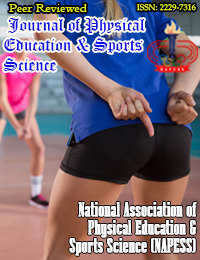Coaches Evaluation: An Assessment of Expert Gymnastics Coaches
Download PDF
The purpose of this study is to assess coaches who involved in Implementation of 8 weeks of Practicum Curriculum for Gymnastics for All Program. The Scholar Selected 8 Coaches for Implementation of Practicum Curriculum for Each Level from “The Gymnastics Academy” situated at Dhul siras, Dwarka, New Delhi, India. The Interview was taken after completion of the Curriculum. The Research scholar collected data for all coaches by the help of Coaching Evaluation Form taken from Bucher A. Charles, (2010) Consist of distinct areas for Evaluation like Personal Conduct, administrative procedural abilities, knowledge and practice of medical legal aspect, coaching methods, Personnel management and public relations. This questionnaire consists of few questions in each category which was asked by the Director of the academy to evaluate the coach’s performance based on his regular observation and monitoring of classes taken by the coaches. The questionnaire can have responded into Three rating scales i.e., Excellent, Acceptable and Not Acceptable. As a result, all coaches lied under Acceptable Category which was a satisfactory result and shown the keen abilities and knowledge of coaches in distinct areas.
Coaches Evaluation: An Assessment of Expert Gymnastics Coaches
Kanika Gupta*, Dr. Samiran Chakraborty*, Dr. Gauri Chakraborty**
*Research Scholar, Department of Physical Education and Sports Sciences, University of Delhi
*Associate Professor, IGIPESS, University of Delhi, Delhi
**Associate Professor, IGIPESS, University of Delhi, Delhi
Abstract
The purpose of this study is to assess coaches who involved in Implementation of 8 weeks of Practicum Curriculum for Gymnastics for All Program. The Scholar Selected 8 Coaches for Implementation of Practicum Curriculum for Each Level from “The Gymnastics Academy” situated at Dhul siras, Dwarka, New Delhi, India. The Interview was taken after completion of the Curriculum. The Research scholar collected data for all coaches by the help of Coaching Evaluation Form taken from Bucher A. Charles, (2010) Consist of distinct areas for Evaluation like Personal Conduct, administrative procedural abilities, knowledge and practice of medical legal aspect, coaching methods, Personnel management and public relations. This questionnaire consists of few questions in each category which was asked by the Director of the academy to evaluate the coach’s performance based on his regular observation and monitoring of classes taken by the coaches. The questionnaire can have responded into Three rating scales i.e., Excellent, Acceptable and Not Acceptable. As a result, all coaches lied under Acceptable Category which was a satisfactory result and shown the keen abilities and knowledge of coaches in distinct areas.
Keywords: Practicum Curriculum, Personnel Management, Gymnastics
Background:
Coaching behaviour have been shown to influence athletes' self-esteem, motivation, performance anxiety, attitudes toward their sport experience, peer relationships, burnout, psychological skills development, physical well-being, and sport attrition.
Assessing the effectiveness of sport coaching techniques is essential to enhance communication between athletes and their coaches. The importance of feedback / feed-forward to improving coaching performance will be discussed with reference to appropriate methods to receive such information. The use of video analysis of coaching behaviours as well as implementing a coach mentoring program will be explored along with methods of coach goal-setting and self-reflection. Athlete learning styles are then considered with respect to the coach as an effective presenter and facilitator.
The following are possible aspects of the coaching session that could be assessed (Martens 1997)
- Health and Safety
- Communication skills
- Coaching Skills
- Interpersonal skills
- Long and short-term Planning
- Training session content and structure
- Knowledge and experience
- Control of athletes
- Monitoring of athletes
Procedure:
Research scholar collected data for all coaches by the help of Coaching Evaluation Form taken from Bucher A. Charles, (2010) Management of Physical Education and sport, P (152). Consist distinct areas on the basis of which coaches were evaluated-
- Personal qualities
- Personal conduct
- Administrative Procedural Abilities
- Knowledge and Practice of Medical-Legal Aspects
- Coaching method
- Strategy
- Rules and Regulations
- Personnel Management
- Public Relations
This questionnaire consists of different questions in each distinct area divided into different 3 rating scales of Excellent which denoted as 1; Acceptable symbolize as 2 and Not acceptable as 3 which was asked by the Director of the academy to evaluate the coach’s performance on the items mentioned above based on his regular observation and monitoring of classes taken by the coaches for 8 weeks of all students involved in training program. The data was taken after completion of the Curriculum.
Analysis of data:
It consists of details of Coaches Assessment. The descriptive statistics techniques were employed and result are presented in the percentage from Figure number 1 to table number 8
Figure 1: Response for Coach 1
The graphical representation is presented in form of cluster column chart in figure no. 1 reveals the response for Coach 1 who got EXCELLENT rating in Personal Conduct Denoted as 1, on the other hand, the Coach others areas namely personal qualities, administrative procedural abilities, coaching method, strategy. Personnel management and public relations got ACCEPTABLE (2) and NOT ACCEPTABLE (3) in Rules and regulation and knowledge and practice of medical-legal aspects.
Figure 2: Responses for Coach 2
The graphical representation is presented in form of cluster column chart in figure no. 2 reveals score of Coach 2 who got EXCELLENT rating in personal qualities, administrative procedural abilities, strategy and Personnel management which denoted as 1, on the other hand, the coach in other areas namely, in personal conduct, coaching method, knowledge and practice of medical-legal aspects, public relations and Rules and regulation received rating of ACCEPTABLE i.e., 2. Whereas, none of the area rated by the director as NOT ACCEPTABLE denoted as 3.
Figure 3: Responses for Coach 3
The graphical representation is presented in form of cluster column chart in figure no. 3 reveals the response for Coach 3 who got EXCELLENT rating in knowledge and practice of medical-legal aspects which denoted as 1, on the other hand, the coach in other areas namely, personal conduct, coaching method, knowledge and practice of medical-legal aspects, public relations and Rules and regulation, personal qualities, administrative procedural abilities, strategy and Personnel management received rating of ACCEPTABLE i.e., 2. Whereas none of the area rated by the director as NOT ACCEPTABLE denoted as 3.
Figure 4: Responses for coach 4
The graphical representation is presented in form of cluster column chart in figure no. 4 reveals the responses for Coach 4 who got EXCELLENT rating in personal qualities which is denoted as 1, on the other hand, the coach in other areas namely, personal conduct, coaching method, knowledge and practice of medical-legal aspects, public relations, Rules and regulation, administrative procedural abilities, knowledge and practice of medical-legal aspects, strategy and Personnel management received rating of ACCEPTABLE i.e., 2. Whereas none of the area rated by the director as NOT ACCEPTABLE denoted as 3.
Figure 5: Responses for Coach 5
The graphical representation is presented in form of cluster column chart in figure no. 5 reveals the responses for Coach 5 who got EXCELLENT rating in personal qualities which denoted as 1, on the other hand, the coach in other areas namely, administrative procedural abilities, coaching method, strategy. Personnel management, public relations, Rules and regulation and knowledge and practice of medical-legal aspects received rating of ACCEPTABLE i.e., 2. Whereas, Personal conduct had been rated by the director as NOT ACCEPTABLE denoted as 3.
Figure 6: Responses for Coach 6
The graphical representation is presented in form of cluster column chart in figure no. 6 reveals the responses for Coach 6 who got EXCELLENT rating in Personnel management which denoted as 1, on the other hand, the coach in other area namely, personal conduct, coaching method, knowledge and practice of medical-legal aspects, public relations, personal qualities, Rules and regulation, administrative procedural abilities, knowledge and practice of medical-legal aspects and strategy received rating of ACCEPTABLE i.e., 2. Whereas none of the area rated by the director as NOT ACCEPTABLE denoted as 3.
Figure 7: Responses for Coach 7
The graphical representation is presented in form of cluster column chart in figure no. 7 reveals the response for Coach 7 who got EXCELLENT rating in personal qualities, knowledge and practice of medical-legal aspects, strategy and public relations which denotes as 1, on the other hand, the coach in the other areas namely, personal conduct, coaching method, knowledge and practice of medical-legal aspects, Rules and regulation, administrative procedural abilities and Personnel management received rating of ACCEPTABLE i.e., 2. Whereas none of the area rated by the director as NOT ACCEPTABLE denoted as 3.
Figure 8: Responses for Coach 8
The graphical representation is presented in form of cluster column chart in figure no. 8 reveals the responses for Coach 8 who got EXCELLENT rating in personal qualities, knowledge and practice of medical-legal aspects and Rules and regulation which denoted as 1, on the other hand, the coach in other areas namely, personal conduct, coaching method, knowledge and practice of medical-legal aspects, administrative procedural abilities, Personnel management, strategy and public relations received rating of ACCEPTABLE i.e., 2. Whereas none of the area rated by the director as NOT ACCEPTABLE denoted as 3.
Conclusion:
The study concluded assessment of coaches in different areas like personal qualities, coaching methodology, strategies, rules and regulations, administration procedural abilities, public relations, medical legal aspects and personnel management found to be acceptable and Satisfactory in all distinct areas the findings of coach’s assessment are concise with Russell, S (1995).
References:
- Rudd JR, Barnett LM, Farrow D, Berry J, Borkoles E, Polman R. Effectiveness of a 16 week gymnastics curriculum at developing movement competence in children. J Sci Med Sport 2017; 20:164-9.
- Carney C, Chedzoy S. Primary student teacher prior experiences and their relationship to estimated competence to teach the national curriculum for physical education. Sport Educ Soc 1998; 3:19-36.
- Betty HF. Physical Education Sourcebook. Champaign: Human Kinetic Publication, Inc.; 1996.
- Rudd JR, Barnett LM, Farrow D, Berry J, Borkoles E, Polman R. The impact of gymnastics on children’s physical self-concept and movement skill development in primary schools. Measurement Physical Education Exercise Science 2017; 21:92-100.
- Coté, J., Saimela, J., Trudel, P., Baria, A., & Russell, S. (1995). The coaching model: A grounded assessment of expert gymnastic coaches’ knowledge. Journal of sport and exercise psychology, 17(1), 1-17.

















